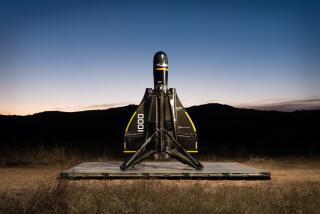Ford Aerospace Is 1 of 2 Finalists for Missile Deal
- Share via
Ford Aerospace said Thursday that it has been named one of two finalists in a competition to develop a new antitank missile for the Marine Corps.
The company’s Newport Beach-based Aeronutronic division received a $13-million, 30-month development contract for the short-range anti-tank weapon, known as SRAW, and Hughes Aircraft Co. received a similar contract. The two companies were chosen over McDonnell Douglas Corp., Honeywell Inc., and Physics International, all of which participated in the first phase of the development program.
Lou Loth, Ford Aerospace program manager, said the new weapon system could eventually be worth hundreds of millions of dollars to the company, though he acknowledged that it is difficult to predict whether the Marine Corps or other branches of the military would ultimately go ahead with deployment.
The Ford SRAW uses so-called top-attack technology, in which the missiles fly over enemy tanks and then dive to hit the lightly armored roofs of the vehicles. Loth said the technology was similar to that used in Ford’s unsuccessful bid for the Army’s lucrative advanced anti-tank weapon system-medium, or AAWS-M, contract.
Ford teamed up with McDonnell Douglas to bid on the AAWS-M contract, but eventually lost the award to Martin Marietta Corp. in 1988 in what was considered a a major setback for the Newport Beach firm. But Loth contended that the Army had given Ford’s technology high marks, and selected the Martin Marietta weapon based solely on price.
The SRAW program, managed by the Naval Surface Warfare Center at Dahlgren, Va., is aimed at developing a 20-pound antitank missile that can be used by foot soldiers at a range of 500 meters. If the program proceeds on track, either Ford Aerospace or Hughes will be chosen to go ahead with full-scale engineering development in 1993.
And if the missile is developed, it could ultimately be sold not only to the Marines, but also to the Army and to foreign governments, Loth said. He said the target price for the weapon is about $3,000.
More to Read
Inside the business of entertainment
The Wide Shot brings you news, analysis and insights on everything from streaming wars to production — and what it all means for the future.
You may occasionally receive promotional content from the Los Angeles Times.








